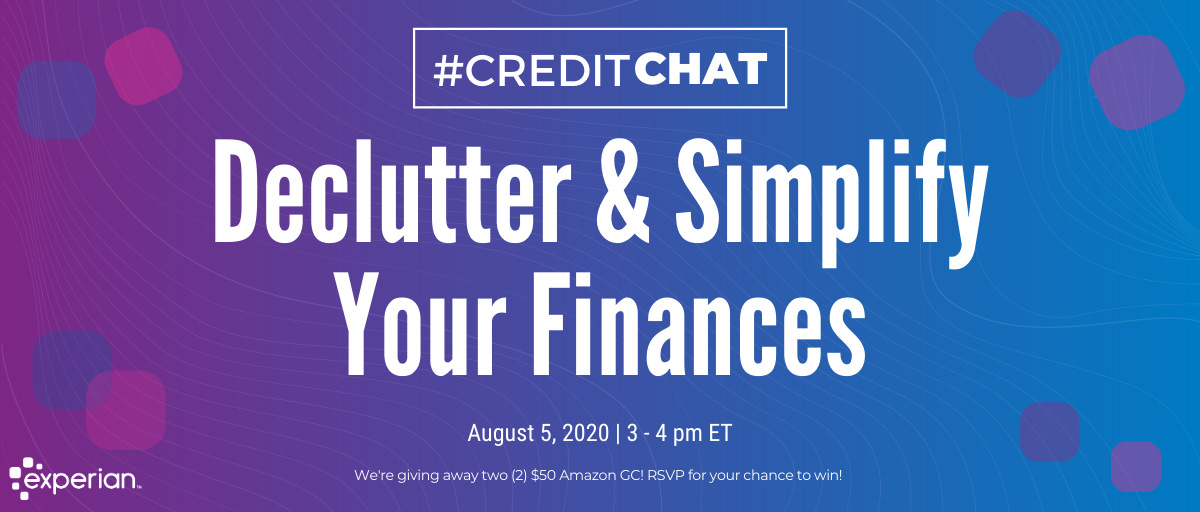Declutter & Simplify Your Finances

The panel included Rod Griffin: Senior Director, Consumer Education and Advocacy, Experian; Christina Roman: Consumer Education and Advocacy Manager at Experian; Forbes Advisor; Kate Ashford: Contributor to Forbes and Monster, Personal Finance Journalist, Content Writer; Beverly Harzog: Credit Card Expert and Consumer Finance Analyst for U.S. News; Paulina Likos: Investing Reporter at U.S. News; Alicia R. Hudnett Reiss: CERTIFIED FINANCIAL PLANNER™; Todd Christensen: Education Manager at Money Fit by DRS; Sara Rathner: Credit Card and Travel Expert, NerdWallet; Molly Ford-Coates: Founder, Ford Financial Management; Kamilah O’Brien: Senior Financial Manager; Leslie H. Tayne, Esq: Founder and Managing Director of Tayne Law Group, P.C. (f/k/a The Law Offices of Leslie H. Tayne, P.C.); Dannielle Romoleroux: Founder of First Gen Money; and HerMoney Media.
Questions We Discussed:
Q1: What are the benefits of being organized financially?
Q2: What are some tips for organizing your financial records?
Q3: How long should you keep documents such as bank statements or tax returns before shredding?
Q4: What are some helpful tips for managing monthly subscriptions?
Q5: What are some of your favorite financial apps to help keep track of your finances?
Q6: How do you decide how many credit cards you need?
Q7: Should you cancel unused credit cards or keep them?
Q8: How do you know if debt consolidation is right for you?
Q9: How often should you review your finances?
Q10: Any last-minute tips for decluttering and simplifying your finances?
Retweet these insights from our community:
A1:
A1. I think being organized with your finances is a stress reliever. You always know where your money is going, you don’t have to worry about whether or not you’ve paid a bill, etc. #CreditChat
— Christina Roman (@Teena_LaRo) August 5, 2020
A2:
A2a: You can get a lot done with some hanging file folders and a sharpie. Organize into big categories: Home, auto, medical, insurance, etc. #CreditChat https://t.co/lSQiBzzqWh
— Kate Ashford (@kateashford) August 5, 2020
A3:
A3b The rule of thumb is to keep the last 7 yrs of tax documents, but I have all of mine since a million years ago.
#creditchat— Focused Spender (@focusedspender) August 5, 2020
A4:
A4: Review your subscriptions every few months and make sure you aren’t paying for anything you don’t use. For example, if you have a subscription to a magazine or newspaper you don’t read anymore, cancel it and put the extra money towards paying off debt! #CreditChat
— American Consumer Credit Counseling (@ACCC_TalkCents) August 5, 2020
A5:
A5: From new budgeters to those who love the old-fashioned envelope system, there are multiple apps that will keep your wallet happy. Here’s a list of the best budgeting apps & personal finance tools for any budget. #CreditChat @mint @claritymoney @ynab https://t.co/jMjIurV3XQ
— Forbes Advisor (@ForbesAdvisor) August 5, 2020
A6:
A6: Some folks have a card for each type of expense. So, if you spend tons on groceries, get a rewards card that offers that reward. I have 4 cards and one has a very low APR that I keep for emergencies. Don’t get more cards than you need or that you can manage. #creditchat https://t.co/W54f4okVVa
— Beverly Harzog (@BeverlyHarzog) August 5, 2020
A7:
A7: “It’s best to keep unused credit cards open so that you benefit from a longer average credit history,” according to Experian
This is a great resource:https://t.co/fngV3O6vKj.#CreditChat— Paulina Likos (@Paulina_Likos) August 5, 2020
A8:
A8: If you are struggling with debt and feel like you can’t pay off your debt on your own, it may be time to consider debt consolidation. Call a credit counselor first to discuss your budget and any other options that may be available to you. #CreditChat
— American Consumer Credit Counseling (@ACCC_TalkCents) August 5, 2020
A9:
A9: When it comes to long-term investing, less often can be better. Swings in the market can cause panic and bad decisions. #creditchat
— Rod Griffin (@Rod_Griffin) August 5, 2020
A10:
A10: Visualize both your goals & exactly where your money is going. Keep your eyes on the prize by creating a hardcopy or digital vision board of your goals & keep track of your spending with a daily diary of your spending. Decide what’s necessary vs your goals. #CreditChat
— Forbes Advisor (@ForbesAdvisor) August 5, 2020